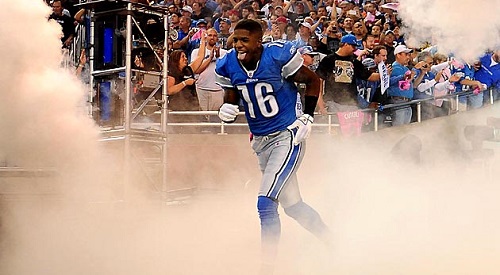
Why Titus Young is more than a punchline
When former NFL receiver Titus Young was arrested for the third time in the span of a week Friday (and later charged with a fourth incident in nine days), it led to a flood of jokes about just how dumb some football players can be off the field. However, the real story may be far more concerning. On Monday, Young’s father, Richard, told the press that his son’s behaviour was out of character, and said it might be attributable to a brain injury. From the Detroit News piece:
Richard Young said his son suffers from a disorder caused by his brain being compressed into the front of his skull, but he couldn’t remember its name Monday. The father said his son’s disposition changed after he suffered a concussion during his rookie season, although the Lions never listed that as an injury.
And from the Free Press:
“I hope they just forgive Titus because this ain’t none of Titus, it wasn’t none of his fault,” Richard Young said. “I look at my son right now, I don’t see my son. That’s not my son. I know my son. Titus is not the boy I really raised, I’m saying the way he act, the way he intermix in society right now. He shut down, he look through you, it’s like he’s depressed. He don’t like to watch TV, he don’t like to get involved with music that much.
While Titus Young’s precise diagnosis should be left to the medical professionals treating him, his father’s description rings very true with what we’ve seen over and over again in cases of concussions. Here’s how former NHL defenceman Chris Pronger described his post-concussion symptoms in an April piece by Brian Cazeneuve in Sports Illustrated:
“It was a dangerous transformation because I didn’t know how I was going to get out of it,” he says. “The buzz was out of my life so fast, and I missed it…. You get isolated, depressed. You don’t want to leave the house. You’re trying to medicate yourself—six beers a night or whatever. You’re not working out. You’re eating chips and chocolate bars, all the staples of a sports reporter’s diet. I was in a pretty dark hole, and my thoughts were swirling. I wouldn’t say I was suicidal, [but] I can see where if you don’t start going in the other direction, [you’re] going to start getting [that way].
It’s a different sport, but Pronger’s comments sound very similar to what Young’s been going through, and he’s far from the only athlete to talk about the disastrous effects concussions can have on your brain. Chalking all of Young’s issues up to an NFL concussion may be going too far, as he was known for behavioural issues at Boise State and in the lead-up to the 2011 draft. Moreover, the Lions haven’t admitted that Young suffered a concussion (although that raises its own questions). As leading concussion researcher Dr. Robert Cantu told me in December, though, many concussion symptoms can be delayed, and functional MRI studies have suggested that even players who haven’t suffered a diagnosed concussion can see declines in cognitive activity. It’s far from certain that head injuries have caused Young’s off-field problems, but the possibility deserves serious examination.
More generally, though, it may be worth changing the tenor of the discussions when an athlete gets into off-field trouble. Yes, it’s easy to point and laugh when a gifted player making millions of dollars can’t keep it together off the field, but there’s often more going on there than meets the eye. Head trauma can be a key factor there, as can all the different pills and injections handed out to deal with it and other injuries (consider the “1,021 pills from about a dozen doctors” former NHL player Derek Boogard was supposedly prescribed during the 2008-09 season), but there are other ones too.
The tough initial circumstances some players grow up with can be difficult to escape, and the oft-hypermasculine culture around sports usually doesn’t help, nor does the sense of celebrity professional (and big-time college) sports can convey. Mental issues can be a significant factor for athletes as well, like people in any other profession, and they often aren’t easy to fix. There’s a good reason all professional leagues are working to improve their rookie education symposiums; it can be very easy for players to fall into serious off-field problems, and whatever leagues can do to prevent that is worthwhile.
That’s not to say that athletes should be able to get away with more than anyone else. They also should be held accountable for their actions. It’s just worth considering that there’s sometimes more behind arrests like Young’s than is immediately evident, particularly when the possibility of behavior-affecting head trauma is brought up. Even beyond that, it seems clear Young may have some significant mental issues, and those should be taken seriously. The first impulse may be to view off-field incidents like Young’s as an easy joke about how dumb athletes are, but that really doesn’t tell the whole story. There will undoubtedly be much more to come in the Young story, but if it turns out head trauma is in fact involved, that should flip the narrative and get people focusing on the off-field consequences of football rather than just Young’s personal problems. Even if football-related head hits aren’t a factor in Young’s case, though, he should still be seen as a person, not a punchline.

